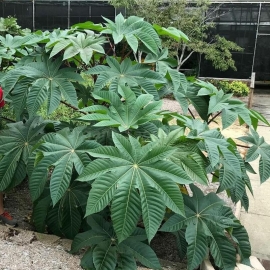







«Zanzibariensis» - Organic Ricinus communis Seeds
1.14 €
Here is another incredible tropical annual that can be grown from Castor Bean seeds to give a dramatic display in the landscape. The Zanzibar plant achieves massive sizes in a single growing season, but it is not tolerant of frost.
-
Organic Castor Oil Plant «Zanzibariensis» / Ricinus communis
Here is another incredible tropical annual that can be grown from Castor Bean seeds to give a dramatic display in the landscape. The Zanzibar plant achieves massive sizes in a single growing season, but it is not tolerant of frost, so in most areas it is grown as an annual.
Giant Castor Bean plants have huge star-like, bronze-green, serrated leaves that can measure up to 24 inches across. It also has 18 inch, drooping seed stalks that contain the seeds. The seeds are pressed for Castor Oil, and used in many animal repellents. This variety is the largest of the Ricinus plants, and it comes from Zanzibar, a small island off the coast of eastern Africa.
Castor Bean seeds can be started indoors 6 - 8 weeks before the last frost date or directly outdoors after frost season has passed. It is recommended to soak the Ricinus seeds for 24 hours in water to help break the seed coat. Cover the flower seed with 1/4 inch of soil and keep moist. Grow the plant in full sun and in soil that is rich and has been amended with organic matter.
Care of the Zanzibar Castor Bean plant would include staking the plant if needed and fertilizing every month (or adding a slow-release fertilizer at the time of planting). In the fall after the first frost, remove the plant and discard.
NOTE
All parts of the plant, including the seeds, are poisonous. Eating the seeds may be fatal. This plant is not recommended if you have small children. Again if you have children that naturally put things into their mouths, you probably should avoid this plant. If you do decide to grow it, educate your children about the dangers of this plant.
